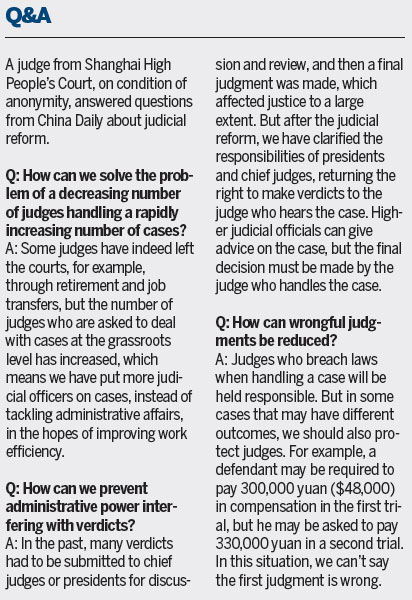Judicial officials to return to court
National reform action seeks to keep legal system independent, put most experienced judges back in trials
Judicial officials, including court presidents, are being encouraged to return to grassroots courts to hear cases - a move that seeks to make trials efficient and legal teams more professional, officials responsible for judicial reform said on Monday.
The number of cases being heard by presidents and chief judges, whose duties have mainly focused on administrative affairs in the past, has been sharply rising in Shanghai, which has a judicial reform pilot program created by the central government in 2013, said Guo Weiqing, deputy president of Shanghai High People's Court.
By the end of last year, 9,531 cases were heard and handled by court presidents or chief judges in Shanghai's four courts, up about 40 percent year-on-year, the high people's court said.
"What we are doing is bringing the case hearings right back to the judges who deal with the case and clarifying their responsibilities, which is aimed at making our trials more professional," Guo said.
The move also was made to control the number of judges, ensuring that the most experienced judicial officers can continue to conduct trials, he said, adding that the goal is also part of the judicial reform.
Gu Quan, deputy director in the reform office at Minhang court, said that a goal of the judicial reform is to reduce the number of judges by 33 percent from the current 200,000 nationwide, and that an additional 52 percent will be reassigned as judicial assistants who help judges draft verdicts and collect materials.
In the first selection, 404 legal officers were selected to be judges in Shanghai's four courts, while 127 were appointed as judicial assistants, Gu said.
He confirmed that 206 people had qualified as judges as the city developed the reform, but weren't named as judges because of their lack of work experience. Instead, they became assistants, he said.
"But there are still openings according to the quota, and if they work hard, they can be added to the judge team at the end of this year, when the second selection starts," he said.
Shen Deyong, vice-president of the Supreme People's Court, said in early July that the best judicial candidates remain in their posts.
Ruan Chuansheng, a Shanghai lawyer, said the selection of judges needs supervision because some courts may still select judges based on seniority instead of ability.
caoyin@chinadaily.com.cn








